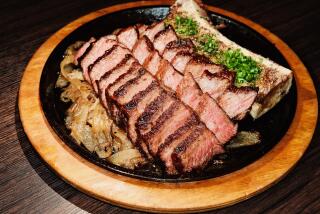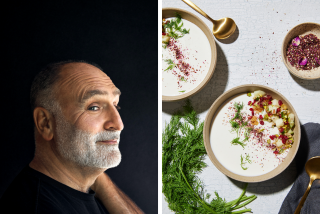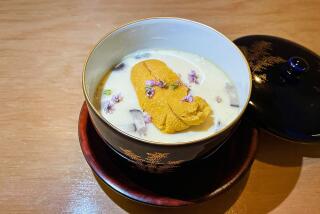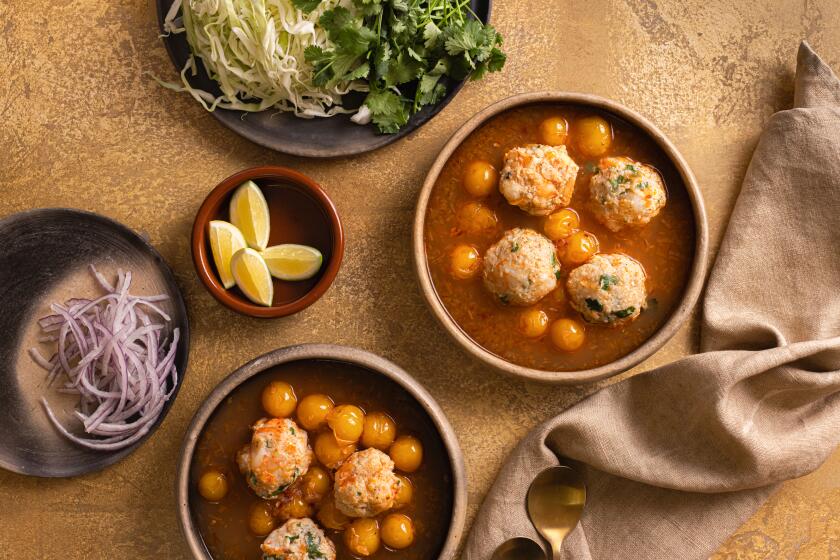Fuchsia Dunlop on inventive chef Yu Bo, and a possible Los Angeles restaurant
One of writer Fuchsia Dunlop’s favorite stories about her adventures in Sichuanese cooking involves a group dinner she had in 2001 at a drab hotel in Chengdu, China. The meal stretched into 42 delicately intricate courses and introduced her to a young envelope-pusher of a chef named Yu Bo. “It was like nothing I’d ever had in China before, the kind of official banquet I’d read about, but never seen.” A few years later, Dunlop put Yu Bo on the map for Western readers after writing for Gourmet magazine about serving as the guide/interpreter for the Chengdu-born Yu Bo and two of his equally popular compatriots – Xiao Jianming and Lan Guijan -- at a Worlds of Flavor conference in Northern California. Now based in England and the author of five cookbooks, Dunlop and Yu Bo, who currently runs a restaurant called Yu Jia Chu Fang (Yu’s Family Kitchen) out of his home with a prix-fixe, seasonal menu, will appear at Food Bowl on May 4. He’ll be showing some of his signature dishes, including a set of 16 different cold vegetable appetizers, says Dunlop. “It’s a demonstration of the famous Sichuanese culinary maxim that each dish has its own style, and a hundred dishes have a hundred different flavors.”
We recently caught up with Dunlop to discuss Sichuan cooking and what chef Yu Bo is cooking.
This interview has been edited for length and clarity.
Talk about Yu’s Family Kitchen.
It’s a very different style of Chinese food from what people in the West are normally used to. It’s like going to a private house and having a banquet in a private room that’s incredibly elegant. You’ll have dozens of courses and a variety of tastes, textures and cooking methods. His style is more like the style of a Michelin-style restaurant. It’s very labor-intensive, incredible tableware. He got his inspiration from the private dining in the grand Mandarin houses in the past when the rich kept private chefs and entertained their friends to amazing dinner parties. His food, as when you go to a very accomplished Michelin-starred restaurant in the West, is a sort of thoughtful intellectual game as well as [one about] tastes.
Give an example of a Yu Bo dish that makes you think.
For hundreds of years, that’s been very much part of Chinese classical gastronomy, sort of playing with the minds of your guests -- eating is an intellectual as well as sensory pleasure. [Yu Bo’s] meals are full of wit. You’ll [be served] a porcelain jar full of calligraphy brushes and a dish of red ink. Even close up the calligraphy brush looks like a calligraphy brush – but it’s actually a flaky puff pastry that’s been folded in such a way that all of the layers look like the hairs of a brush. Then you dip it into the ink – which is actually a sauce – and then you pop it into your mouth.
There’s another classic Sichuanese dish that he sometimes does. You get a bowl of what looks like freshly made silken tofu. But it’s actually chicken breast that’s been pulverized to a very fine paste with a bit of egg white and starch. It’s a kind of joke: It looks like cheap Sichuanese street food, but a lot of culinary technique has gone into it.
When did official banquet dining resurface in China?
This style of private dining obviously disappeared in the Cultural Revolution. It wasn’t acceptable to have these kinds of banquets. Chinese cooking has been recovering and rediscovering a lot of its past sophistications. But Yu Bo is very individualistic, has always thought like an artist. He and his wife, Dai Shuang, very much understand traditional roots of Sichuanese flavoring techniques, ingredients and gastronomy – but he sort of plays with tradition in a very inventive way. He’s a very unusual talent.
You lead gastronomic tours of China. What’s your pitch for Chengdu?
Chengdu is famously a very relaxed place, very independent thinking. The people are famous for being idle, pleasure-loving; they just like to spend their whole lives sitting in tea houses, gossiping and eating delicious food. Because of its wonderful climate, soil and produce, Chengdu has historically been known as the land of plenty. Like California, there’s an obsession with seasonality. This goes back hundreds, even thousands of years in Chinese history. Of course, the most famous ingredient is the chile and that’s a fairly recent Mexican import. It’s one of the most exciting culinary destinations in China because of the electrifying flavors. You have heat, the tingliness of the Sichuan pepper. There’s an amazing array of fresh ingredients. Sichuanese food is never dull.
Yu Bo has spent time in Los Angeles. Is he looking to open something here?
I think he’d like to do something more permanent [in Los Angeles]. One of his motivations is to show people a different side of Chinese cuisine and I think he’d like to do that abroad.
More to Read
Eat your way across L.A.
Get our weekly Tasting Notes newsletter for reviews, news and more.
You may occasionally receive promotional content from the Los Angeles Times.






